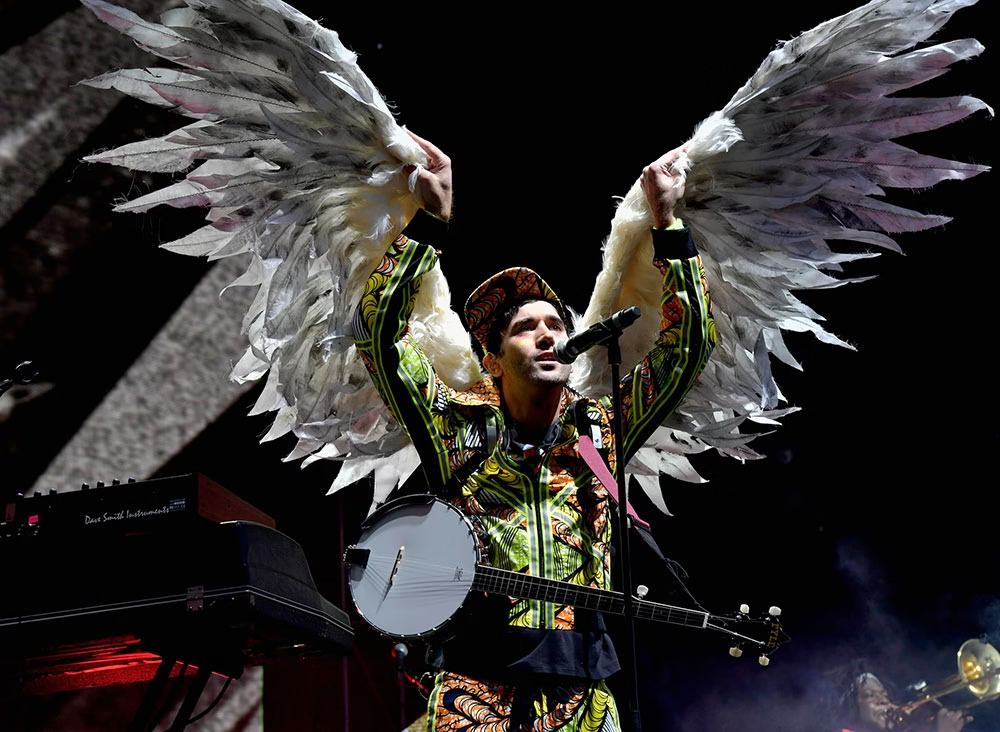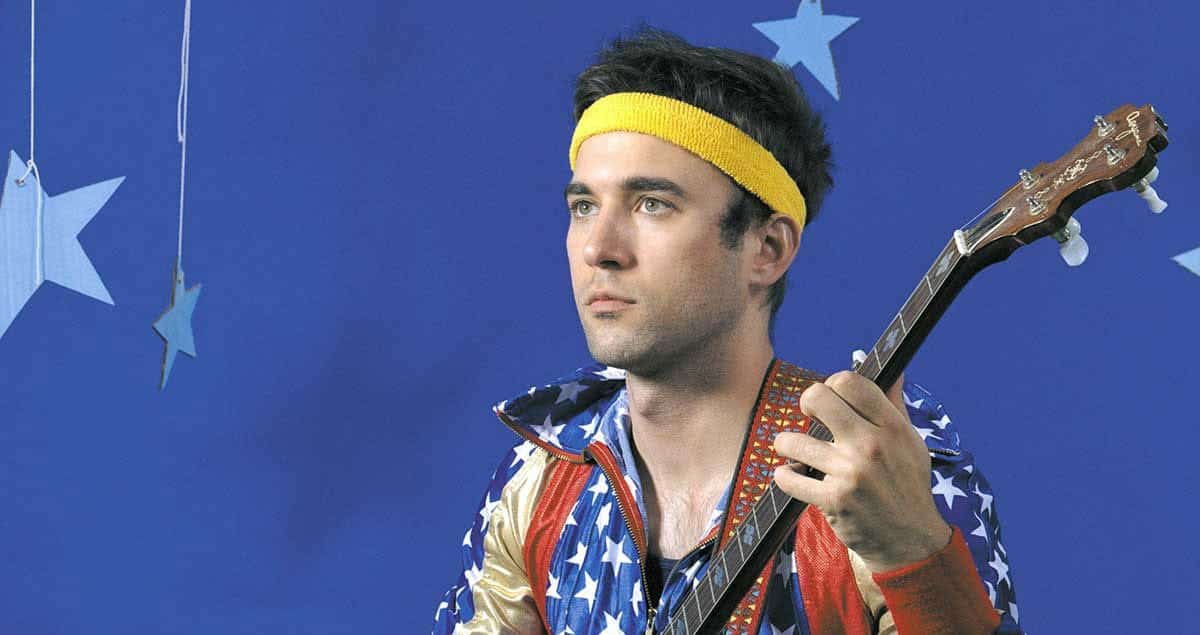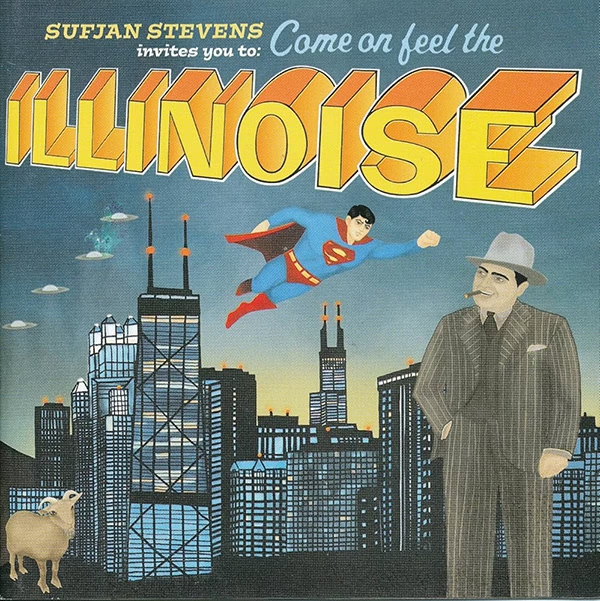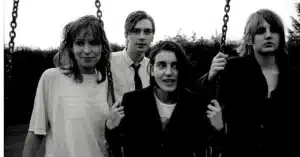Sufjan Stevens: The Architect of Intimate Universes and Orchestral Emotion
Sufjan Stevens. Origins: Classical Training and Spiritual Songcraft
Sufjan Stevens was born on July 1, 1975, in Detroit, Michigan. Raised in a spiritually eclectic household, he was named after Abu Sufyan, an early Islamic historical figure, chosen by the founder of the Subud spiritual movement. Sufjan studied classical music and literature, and this academic foundation would later inform his highly conceptual, literary, and musically intricate style.
In 1999, he released his first solo album and co-founded Asthmatic Kitty Records, which became home to his vast and ambitious catalog.

Sufjan Stevens. Musical Style: Baroque Folk, Electronic Meditations, and Conceptual Maximalism
Sufjan Stevens’ music resists genre boundaries:
- Indie folk, chamber pop, baroque orchestration, ambient, glitchy electronica, and even contemporary classical
- Instruments range from banjos and oboes to drum machines and synthesizers
- Lyrics full of religious imagery, American iconography, queer identity, childhood trauma, grief, and transcendence
- Known for creating huge conceptual frameworks—yet never sacrificing emotional honesty
Whether crafting songs about U.S. states or unraveling the intimacy of personal loss, his music feels like an illuminated manuscript: delicate, mystical, and overwhelming.
Sufjan Stevens. Discography: Albums of Monumental Intention and Deep Vulnerability
🎻 1. A Sun Came (1999)
Debut album. Eclectic world music, Middle Eastern scales, experimental folk.
Raw and exploratory.
Highlights: Demetrius, Joy! Joy! Joy!
🏛️ 2. Enjoy Your Rabbit (2001)
Conceptual electronic album based on the Chinese Zodiac.
Wholly instrumental, glitchy, and hypnotic.
A cult favorite for fans of minimalist and experimental sound design.
🇲🇴 3. Michigan (2003)
🎯 The first of his “50 States Project”.
Choral arrangements, brass, banjo, piano—melancholy and majestic.
For the Widows in Paradise, Detroit, Oh God, Where Are You Now?
Explores Rust Belt beauty and spiritual decay.
🇮🇱 4. Seven Swans (2004)
Sparse, acoustic, spiritual.
Biblical allegories and meditations on faith and fear.
Key tracks: The Dress Looks Nice on You, To Be Alone with You, Abraham
🇮🇱 5. Illinois (2005)
🎯 Masterpiece.
A wildly ambitious, orchestral concept album about the state of Illinois.
Combines history (John Wayne Gacy), personal storytelling, and symphonic complexity.
Chicago, Casimir Pulaski Day, The Predatory Wasp of the Palisades
One of the defining albums of 2000s indie.
🎹 6. The Age of Adz (2010)
Departure into electronic noise, glitch pop, and existential chaos.
Inspired by schizophrenic artist Royal Robertson.
A radically personal, apocalyptic album about mental illness, love, and mortality.
I Walked, Futile Devices, Impossible Soul (25-minute closer)
🖤 7. Carrie & Lowell (2015)
His most intimate and devastating work.
An acoustic elegy to his mother, Carrie, and stepfather, Lowell.
Sparse guitars, whispery vocals, themes of grief, guilt, and memory.
Should Have Known Better, Fourth of July, No Shade in the Shadow of the Cross
💻 8. The Ascension (2020)
Synth-driven, minimalist, anxious.
Explores disillusionment with modern life, politics, and identity.
America, Sugar, Video Game
🌊 9. Convocations (2021)
Five-volume instrumental meditation on death, mourning, and transcendence.
Ambient, electronic, classical.
A response to his father’s passing. Pure atmosphere.
🩷 10. Javelin (2023)
🎯 Return to lyric-driven, multi-instrumental indie folk.
Blends Carrie & Lowell’s intimacy with Illinois’ orchestration.
Themes: love, faith, heartbreak, identity, isolation.
Will Anybody Ever Love Me?, Everything That Rises, Shit Talk
Sufjan Stevens. Live Performances: Visual, Theatrical, Transformative
- Sufjan’s live shows often blur the line between concert, performance art, and spiritual ritual
- Themed costumes (e.g. wings, Superman, neon dancers), light shows, films, and multimedia
- Contrasts quiet solo performances with lavish full-band orchestrations
- Live at the Kennedy Center and Austin City Limits are celebrated performances
Sufjan Stevens. Lyrics and Themes
Recurring themes include:
- Faith, doubt, transcendence, mortality
- American history and mythology filtered through personal lenses
- Queer identity, grief, and emotional fragility
- The line between sacred and profane, childhood innocence and adult disillusionment
- Songs often unfold like confessions whispered inside cathedral walls
Sufjan Stevens. Legacy and Influence
- A cult figure turned critical giant—Sufjan helped define the emotional ambition of 21st-century indie
- Illinois and Carrie & Lowell are frequently cited in “best albums of the century” lists
- Inspired artists like Bon Iver, Fleet Foxes, Phoebe Bridgers, Moses Sumney, and Anohni
- Soundtrack contributions include Call Me by Your Name, Little Miss Sunshine, The Banshees of Inisherin
- Sufjan balances radical privacy with radical vulnerability in his art
Curiosities
- Despite promising a “50 States Project,” he admitted it was a joke taken too seriously
- He rarely gives interviews and avoids the spotlight
- Carrie & Lowell was recorded on a laptop in a hotel room and became one of the most beloved albums of the decade
- Opened up about his queer identity and rare neurological disease (Guillain-Barré syndrome) in 2023
Where to Start Listening?
- Illinois – For ambitious, genre-bending symphonic indie
- Carrie & Lowell – For devastating emotional depth
- The Age of Adz – For experimental, glitch-laden introspection
- Javelin – For his most recent fusion of vulnerability and grandeur
- Seven Swans – For spiritual, acoustic beginnings
Sufjan Stevens. Official Site and Streaming Platforms
www.music.sufjan.com
Socials: @sufjan
Spotify, Apple Music, Bandcamp, YouTube – full discography, collaborations, film scores, and unreleased rarities





